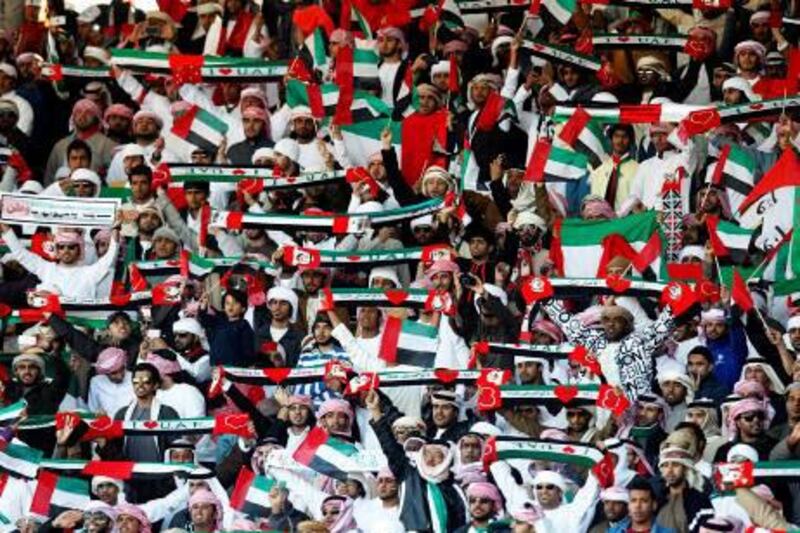As he met the team in the dressing room before the 2007 Gulf Cup final, Yousuf Al Serkal had a simple message for the players.
"The trophy is in our hands and we should not give it away," the then and current UAE Football Association chief told the players. And they didn't, beating Oman for the country's first regional or international football trophy.
Al Serkal will likely have similar words for Mahdi Ali's men this time around as well, just before they take to the pitch to face Iraq in Friday's final.
The UAE were playing at home then, in front of nearly 60,000 cheering fans at Zayed Sports City on that night six years ago. Manama is not Abu Dhabi, but the Whites will not be lacking in support with around 25 planes expected to fly in fans for the game.
There were thousands of them in Bahrain for the semi-final as well and every member of the UAE contingent, from Al Serkal and Mahdi Ali to Ahmed Khalil, thanked them for the support.
Things were very different not so long ago. The national team were playing in front of empty stands at home and an irked Mahdi Ali had threatened to play all future UAE matches away from home after a friendly in October.
"It is very strange when you play at home and you see that the crowds for the opponents is more," Mahdi Ali said at the time. "I think when your national team is playing, you don't need to be invited to attend the game.
"I am really disappointed and I hope we could play in a better environment."
The UAE's coach's wishes have come true in Bahrain. The UAE fans are finally waking up to the exciting potential of this golden generation. And they are not alone. The team have managed to charm virtually every coach and official at the Gulf Cup, and even their opponents on the pitch.
Sheikh Talal Al Fahad, the chief of the Kuwait Football Association, described the UAE as the Arabian Gulf's "super team" and said: "I have not seen any UAE team at this level, with all due respect to the previous generation as well as the winning team of 2007."
Diego Maradona, the Argentine legend, has also been "surprised" by the Whites' "tactical discipline" and "perfect system" in Bahrain.
All that is in the past though. Hakeem Shakir's Lions of Mesopotamia are a different breed to anything that Mahdi Ali's men have faced in Bahrain until now. In the opinion of Frank Rijkaard, the recently dismissed Saudi Arabia coach, all the teams at this Gulf Cup were virtually at the same level, except for Yemen and Iraq.
According to the Dutch legend, the Iraqis were ahead of the rest, with a distinct "European style of football" with "strong defending and swift attacks". They showed that through the group stages, physically dominating the likes of Saudi Arabia and Kuwait.
That style, however, is not alien to this group of UAE players. They faced Great Britain, Uruguay and Senegal at the London Olympics and, although they lost two and drew with the African side, the team gained many admirers. More recently, they beat Estonia in a friendly as well.
The demands of a final are very different though and the Iraqis will test the UAE to the limit. The old fox Younis Mahmoud will be a stiff challenge for Mohammed Ahmed and Mohaned Salem at centre back, if Mahdi Ali persists with the duo who have kept a clean sheet in the last two games. But you can never be sure as the UAE coach always has a plan.
A more exciting battle will be fought in the middle and thankfully Khamis Esmail is available to lend some size and aggression to a gifted UAE midfield. The Iraqis, who got five yellow cards in their semi-final, will surely test the patience and resolve of the two Abdulrahmans, Amer and Omar.
The final then promises to be an engrossing battle of two diverse styles, but most importantly for Arabian Gulf football a native coach will eventually lift the trophy, in a region where foreign managers have traditionally been preferred
Two of them who failed at the Gulf Cup - Frank Rijkaard of Saudi Arabia and Qatar's Paulo Autuori - have already lost their jobs.
Naturalisation has also been exposed as a poor ploy and Qatar have promised a rethink. The UAE players and their coach, and Shakir, who replaced Zico as the Iraq coach, have opened many eyes. And that is the biggest success of this Gulf Cup. Ingenuity is not the sole domain of foreign minds.
Follow us
[ @SprtNationalUAE ]





